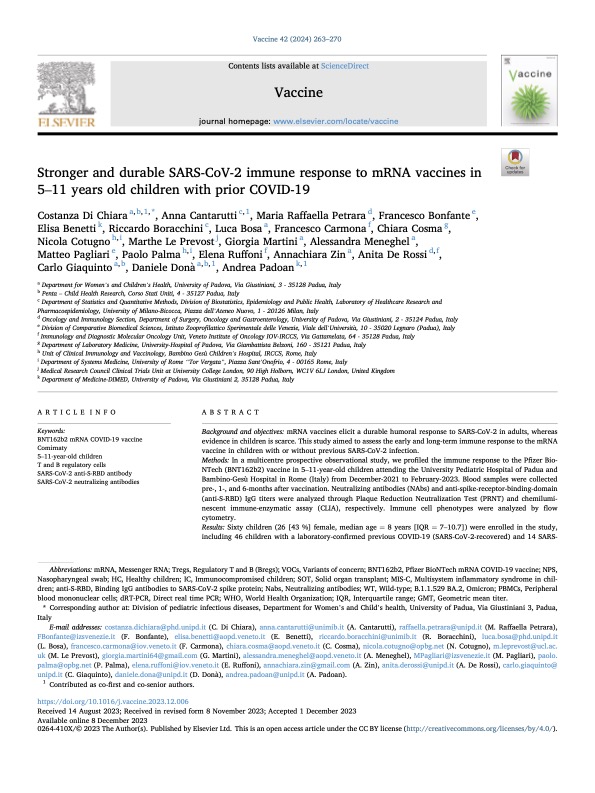Publication links
Abstract
Background and objectives
mRNA vaccines elicit a durable humoral response to SARS-CoV-2 in adults, whereas evidence in children is scarce. This study aimed to assess the early and long-term immune response to the mRNA vaccine in children with or without previous SARS-CoV-2 infection.
Methods
In a multicentre prospective observational study, we profiled the immune response to the Pfizer BioNTech (BNT162b2) vaccine in 5–11-year-old children attending the University Pediatric Hospital of Padua and Bambino-Gesù Hospital in Rome (Italy) from December-2021 to February-2023. Blood samples were collected pre-, 1-, and 6-months after vaccination. Neutralizing antibodies (NAbs) and anti-spike-receptor-binding-domain (anti-S-RBD) IgG titers were analyzed through Plaque Reduction Neutralization Test (PRNT) and chemiluminescent immune-enzymatic assay (CLIA), respectively. Immune cell phenotypes were analyzed by flow cytometry.
Results
Sixty children (26 [43 %] female, median age = 8 years [IQR = 7–10.7]) were enrolled in the study, including 46 children with a laboratory-confirmed previous COVID-19 (SARS-CoV-2-recovered) and 14 SARS-CoV-2-naïve participants defined as the absence of antigen-specific antibodies before vaccination. SARS-CoV-2-recovered participants recorded higher anti-S-RBD IgG and Wild-type and Omicron BA.2 NAbs titers than SARS-CoV-2-naïve participants at both 1- and 6-months after vaccination. Antibody titers correlated with T (Tregs) and B (Bregs) regulatory cell frequencies in SARS-CoV-2-recovered children. Both SARS-CoV-2-recovered and SARS-CoV-2-naïve participants decreased antibody titers by approximately 100 to 250 % from 1 to 6 months. While children with immunocompromising underlying conditions developed immune responses comparable to those of healthy children, solid organ transplant recipients exhibited lower levels of NAbs and anti-S-RBD IgG titers, as well as reduced frequencies of Tregs and Bregs.
Conclusions
mRNA vaccination triggered a higher production of specific anti-SARS-CoV-2 antibodies along with increased levels of regulatory cells in children with previous SARS-CoV-2 infection up to the following 6 months. These findings provide insights into boosting pre-existing immunity.
Keywords
Citation
Costanza Di Chiara, Anna Cantarutti, Maria Raffaella Petrara, Francesco Bonfante, Elisa Benetti, Riccardo Boracchini, Luca Bosa, Francesco Carmona, Chiara Cosma, Nicola Cotugno, Marthe Le Prevost, Giorgia Martini, Alessandra Meneghel, Matteo Pagliari, Paolo Palma, Elena Ruffoni, Annachiara Zin, Anita De Rossi, Carlo Giaquinto, Daniele Donà, Andrea Padoan,
Stronger and durable SARS-CoV-2 immune response to mRNA vaccines in 5–11 years old children with prior COVID-19,
Vaccine,
Volume 42, Issue 2,
2024,
Pages 263-270,
ISSN 0264-410X,
https://doi.org/10.1016/j.vaccine.2023.12.006.

